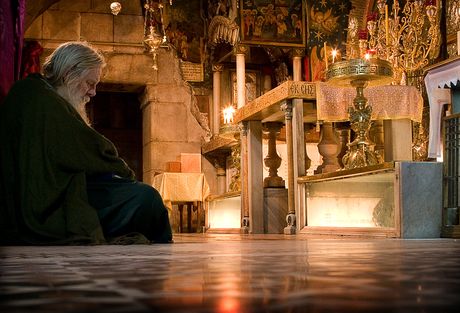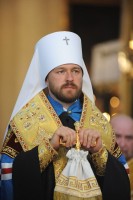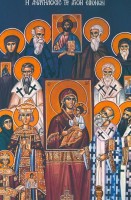Source and copyright: Holy Resurrection Orthodox Church
In Great Lent the Church calls us to repent of our sins and to express this repentance through prayer, fasting, and almsgiving. As we approach this season, it may be helpful to distinguish the Orthodox Christian conceptions of sin, atonement, and salvation from ideas that we frequently hear in Western Christianity.
Western Christianity tends to understand sin and atonement in legal terms, using the language of the law courts. Sin is a transgression, a breaking of a commandment, and therefore deserving of a penalty or punishment. God is identified with justice, which must be satisfied. Following St. Augustine of Hippo (d. 430), Western Christians have traditionally thought of sin as a corruption of human nature inherited from Adam; thus all humans are by definition sinful.
Anselm of Canterbury (d. 1109), attempted to explain how Our Lord’s death on the Cross brought about atonement, or reconciliation of man to God. Anselm saw this in terms of feudal honor: man’s sin is a dishonor to his creator, for which satisfaction must be made. Only a perfect offering is sufficient to satisfy this “debt,” so the Son of God becomes human and by His perfect sacrifice pays the debt to the Father on our behalf. The Protestant reformers developed this theory by speaking of God’s justice rather than His honor, and emphasizing the “substitutionary” character of Christ’s sacrifice; He paid the debt or suffered the penalty instead of us. In one form or another this “satisfaction” theory of atonement has dominated Western Catholic and Protestant teaching until this day.
The Protestant reformers also bore down on passages in St. Paul’s epistles such as “Abraham believed God, and it was counted unto him for righteousness” (Romans 4:3), interpreting them to mean it is impossible for men actually to be righteous; atonement only means we are accounted such. As such, “salvation” is a legal status. It is not related to our behavior; that would imply some merit on our part rather than God’s free gift (“salvation by faith alone”). Some would ask for a ‘decision for Christ’; the strictest Calvinists would not do this as man has no power to decide. In all this the only concern is the reconciliation of man and God. The parallel estrangement of men from each other is not engaged. For many, salvation has no relation to the Church, which a person may “join” or be baptized in after he is saved. And for many, a person who is “saved” cannot lose this status, because he cannot frustrate God’s “sovereign” will.

Orthodox Christians have a completely different perspective on all this. Neither Augustine nor Anselm nor the Reformers were widely known or influential in the East, where most Christians were at the time. For Orthodox, universal mortality, not universal sin, is the consequence of Adam’s sin. “All have sinned” (Romans 3:26) is a statement of fact about men’s choices, not a description of man’s nature. The Greek work for sin (amartia) means missing the mark. Sin is spoken of not mainly as the breaking of laws but as a breaking of man’s relationship to God and his neighbor. It is a distortion or loss of the goodness and righteousness man is created for, an alienation or exile from man’s true home. In Orthodox teaching, sin is not a natural or normal attribute of human life; to be truly human and to be sinful are contradictory. No matter how depraved a man is, he retains the image of God. In Genesis, when Adam and Eve disobey God they are also immediately separated from each other (fig leaves, blaming each other) and from the created world – “thorns also and thistles shall it bring forth to thee…in the sweat of thy face shalt thou eat bread” (Gen. 3:18). Redemption must also mean healing the breech between man and man as well as between man and God. “My brother is my life,” says St. Anthony of Egypt.
For Orthodox, the Cross is an awesome mystery. Many images are used of it in scripture and none explains it. Our Lord does speak of Himself as a sacrifice, as when He identifies His Body with the Passover sacrifice. He also speaks of Himself as a ransom (St. Mark 10:45), but Orthodox do not understand this as a legal transaction. Orthodox would understand “ransom” simply to mean that Christ’s death secures our release from captivity. To attempt to explain the ransom too rationally leads to distortion. St. Gregory the Theologian (d. 389) exposes the problems of “ransom” as an explanation by asking, “to whom is the ransom paid?” Some, such as Origen, suggested it was paid to the Devil. St. Gregory says it is blasphemous to suggest that God would “owe” anything to the Devil or be obliged to pay him something to accomplish His will. On the other hand, to say (as Anselm later did) that it was paid to God the Father is also blasphemous, suggesting the Father is a despot who would be pleased by the suffering of His own Son. St. Gregory says,
But if to the Father, I ask first, how? For it was not by Him that we were being oppressed; and next, on what principle did the Blood of His Only begotten Son delight the Father, Who would not receive even Isaac, when he was being offered by his father, but changed the sacrifice, putting a ram in the place of the human victim? Is it not evident that the Father accepts Him, but neither asked for Him nor demanded Him; but [accepts Him] on account of the Incarnation, and because Humanity must be sanctified by the Humanity of God, that He might deliver us Himself, and over come the tyrant, and draw us to Himself by the mediation of His Son, Who also arranged this to the honour of the Father, Whom it is manifest that He obeys in all things?
Second Paschal Oration
Orthodox see atonement as effected not by the Cross alone but by Christ’s Incarnation, his entire human life, his death and Resurrection. The imagery most often used of the Cross in Orthodox liturgy and hymnody is that of a cosmic conflict and victory. Christ has become man and descended to death to do battle with sin, Satan and death and overcome them by His obedience, humility, faith and love. “When Thou didst descend to death O Life Immortal, Thou didst slay hell with the splendor of Thy Godhead…” – Resurrectional Troparion, tone 2. His words, “Father, forgive them…” from the Cross are already a victory over all that Satan could do. And Orthodox see atonement as intended to be a cosmic restoration of man to God, to his neighbor, and to the created world: “the creature [creation] itself also shall be delivered from the bondage of corruption into the glorious liberty of
the children of God” (Romans 8:21) And our reconciliation takes place not individually, but in the Church; it is appropriated by Baptism and Holy Communion, and we are supported in it by the prayers of other Christians living and departed.
Orthodox object that the characterization of Christ’s sacrifice as substitutionary suggests we don’t have to share it. We sometimes hear it preached, “He did it all.” If Our Lord teaches anything, He teaches that we must take up our own Cross and follow Him. He gives us the privilege of sharing in the struggle and therefore in the victory. “He that shall endure unto the end, the same shall be saved.” (St. Matthew 24:13). This privilege of sharing in the struggle occurs through the use of our freedom to do the good works He has prepared for us to walk in (Ephesians 2:10), to allow God to transform us so that we become righteous and holy, not just legally but actually.
All this has a bearing on what we do in Lent. Repentance (metanoia, change of mind) must be a life-long process of being changed by dying to self so that we may be born anew in Christ’s Resurrection. Lent came about as a time of preparation for those who were to be baptized at Easter, and the image of baptism is central to the Lenten services. On the eve of Pascha we hear, “Know ye not, that so many of us as were baptized into Jesus Christ were baptized into his death? Therefore we are buried with him by baptism into death: that like as Christ was raised up from the dead by the glory of the Father, even so we also should walk in newness of life” (Romans 6:3). This death of the self that is captive to sin is made possible by Christ’s saving work, but we must willingly choose it as our own. “If any man will [wishes to] come after me, let him deny himself, and take up his cross, and follow me.” (St. Matthew 16:24) Taking up our cross may mean taking up whatever life presents us with and bearing it with humility and obedience, in union with Christ, as our sharing in the one perfect offering that Christ has made. It is not that what we do has some “merit,” that we purchase God’s favor by it. It is that this our cross is the means God may use to change us, to bring about the “change of mind” that is our salvation.
This is illustrated again and again in the Lenten services. On the second Sunday before Lent, Orthodox hear the Gospel of the Prodigal Son. This is a perfect picture of sin and reconciliation. The sins of the Prodigal do not consist primarily in breaking laws but breaking the relationship with his father. He is in exile, and when he “comes to himself” he realizes what he has lost and returns. The father receives him joyfully and restores to him the “first robe,” the dignity he had forsaken.
In the fifth week of Lent, we hear the story of St. Mary of Egypt (5th century) an Egyptian woman who lived a life of sexual addiction until her miraculous conversion in Jerusalem, whereupon she crossed the Jordan into the desert and lived a solitary life of great austerity for 47 years. For much of this time she endured great temptation and struggle, but at the end of her life she was seen to work many miracles such as prophesy and walking on water. Her conversion and healing are effected by God’s grace, but her cooperation and effort are also necessary. Her ascetic life is not a penalty or payment for her sins, but the means by which she is healed and restored.
We invite you to “Come and see” in the Lenten services a different perspective on our sins and the awesome mystery of our Redemption.
















